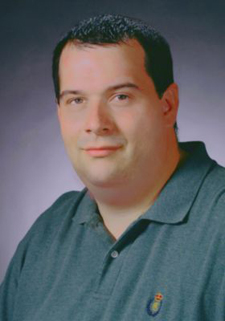Dr. Thomas E. Daniels
Thomas E. Daniels, Ph.D. is Assistant Professor, Department of Electrical and Computer Engineering, Iowa State University. His work is primarily focused on the network identity at many different layers of abstraction. This work directly relates to his auxiliary work in security education, network testbeds, network integrity modeling, and intrusion detection.
Tom focuses on:
- Graph Spectral Methods for Network Investigation An NSF-funded project to use graph spectral methods to process network evidence for investigation and response to attacks. DILON: Detecting Intrusions at Layer ONe
- Monitor Placement for Network Attack Attribution
- XenWorlds: Hypervisor-based Virtual Networks for Education
- Clark-Wilson-based Integrity Models for Networks
- NetBottle: Environment Modeling and Traffic Generation for Network Security Testbeds
Tom was coeditor of the Information Systems Frontiers special issue on Secure Knowledge Management. He authored Reference models for the concealment and observation of origin identity in store-and-forward networks and A functional reference model of passive systems for tracing network traffic, and coauthored Building evidence graphs for network forensics analysis, Identification of Host Audit Data to Detect Attacks on Low-level IP Vulnerabilities, Xen Worlds: Xen and the art of computer engineering education, Diffusion and graph spectral methods for network forensic analysis, Network traffic tracking systems: folly in the large?, A Signal Fingerprinting Paradigm for General Physical Layer and Sensor Network Security and Assurance, Read the full list of his publications!
He earned his B.S. in Computer Science at Southwest Missouri State University in 1995, his M.S. in Computer Science at Purdue University in 1999, and his Ph.D. in Computer Science at Purdue University in 2002. He did his graduate work initially in the Computer Operations, Audit, and Security Technology (COAST) Lab and then in the Center for Education and Research in Information Assurance and Security (CERIAS). He was the 2003 Digital Forensic Research Workshop Forensic Feud Contest Champion.
